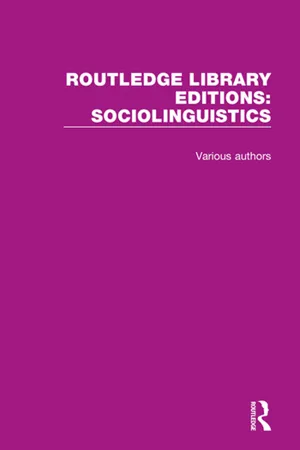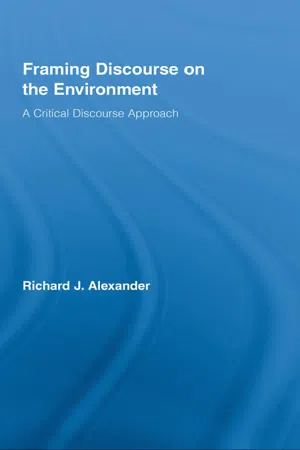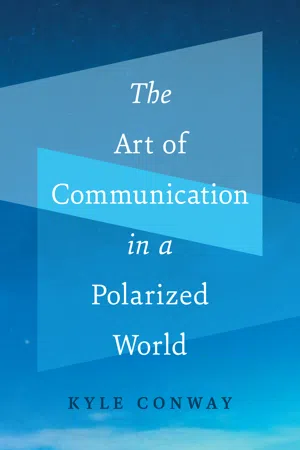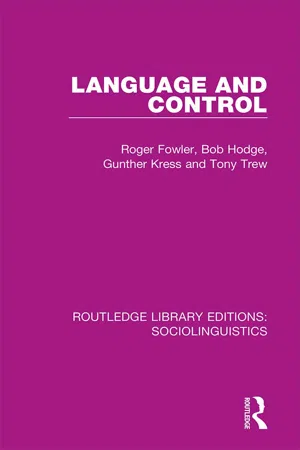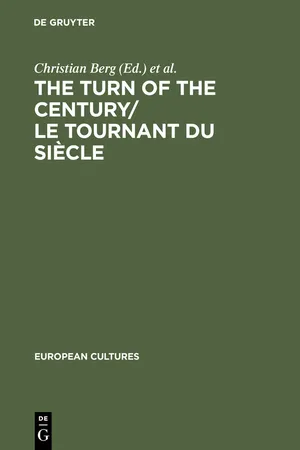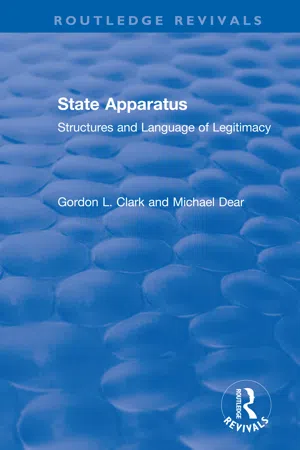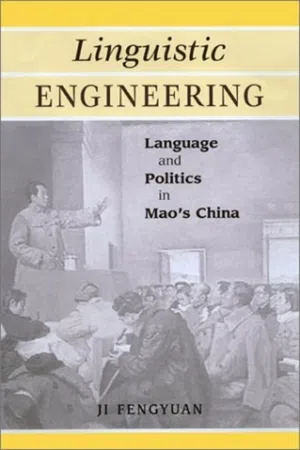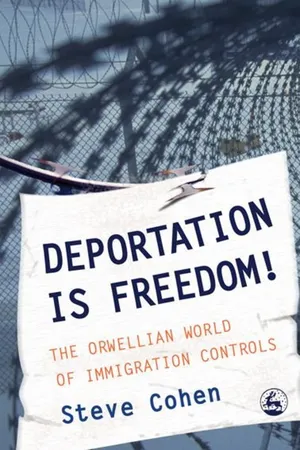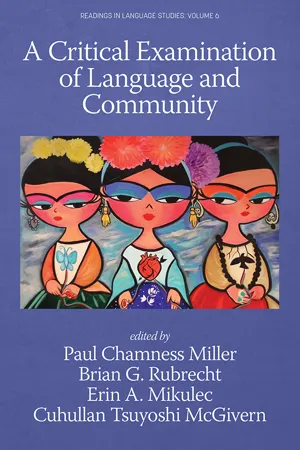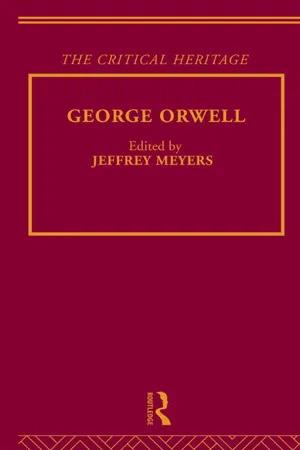Languages & Linguistics
1984 Newspeak
Newspeak is a fictional language created by George Orwell in his novel "1984." It is characterized by its deliberate reduction of vocabulary and the elimination of words that could express unorthodox or rebellious thoughts. Newspeak is designed to limit freedom of thought and promote the ideology of the ruling party, making it a tool for political control and manipulation.
Written by Perlego with AI-assistance
Related key terms
1 of 5
11 Key excerpts on "1984 Newspeak"
- eBook - PDF
- Various Authors(Author)
- 2021(Publication Date)
- Routledge(Publisher)
produced will be definitive, and that 2050 will be the year for the final change- over to Newspeak. These predictions should be treated with the same scepticism as the periodic announcements that a final victory over Eastasia/Eurasia is at hand. The theories on which these predic- tions are based are offered for critical inspection by a sociologist of linguistics. The relation of this critique to Orwell's own views·is intriguing, since the Newspeak theorists are trying to carry out a reform similar to the Basic English programme of Ogden, Chase and others, which Orwell in the 1930s saw as a positive weapon against the degeneration of English. The basic premise of the Newspeak programme is a very crude 20 ORWELLIAN LINGUISTICS form oflinguistic determinism, that is, the belief that language com- pletely determines thought.· In linguistics, thinkers like Whorf 7 have developed subtle forms of this theory, hut the view in the Appendix is not subtle. The purpose of Newspeak was not only to provide a medium of expres- sion for the world-view and mental habits proper to the devotees of Ingsoc, but to make all other modes of thought impossible. It was in- tended that when Newspeak had been adopted once and for all and Old- speak forgotten, a heretical thought - that is, a thought diverging from the principles oflngsoc -' should be literally unthinkable, at least so far as thought is dependent on words (r984, ed. cit., p. 24I). The method for achieving this control involves a simple but labor- ious method, based on a simple-minded understanding of language. Language is seen essentially as a set of words whose meaning is fixed and determined by dictionary entries. The lunatic logic of the New- speak programme works by rewriting the dictionary, cancelling unwanted words and meanings. Q!Iite apart from its implausible premise (in fact most people learn most words through use, not from a dictionary) this programme involves a number of contradictions. - eBook - ePub
Framing Discourse on the Environment
A Critical Discourse Approach
- Richard Alexander(Author)
- 2010(Publication Date)
- Routledge(Publisher)
(1979:2–3) acknowledge that “Orwell recognized some of the connections between language, ideas and social structure which are at the centre of our argument, and in his novel 1984 he explored the notion that language-structure could be mobilized to control or limit thought” in their preface. As they say: “His concepts of ‘doublethink’, ‘newspeak’ and ‘duckspeak’ rest on recognizable principles of language-patterning.” Perhaps such a linguistic approach would be of direct value in a critical account of contemporary culture. Take Hodge and Fowler’s comment on 1984 (1979:6): “[F]or a novel which has had such an impact on our general consciousness about the language of politics, 1984 ’s analysis of this topic is curiously underestimated. It is as if the talismanic words ‘Newspeak’, ‘reality control’ and ‘doublethink’ have passed too quickly into the English language.” How would Chomsky’s work fit in here? Considerin the role of language in propaganda alongside the other devices of Western propaganda systems can be of benefit Even if the focus is not explicitly on the forms of language for Chomsky, Chilton shows a shared concern and orientation with Chomsky, writing (1988:79): “The purpose of these propaganda systems is, to quote Noam Chomsky [(1979:38)], ‘to fix the limit of possible thought’.” Chomsky’s very words themselves are reminiscent of the creatively destructive ‘lexicographer’, Smythe, who tells Winston in 1984 (Orwell 1949:45) that “the whole aim of Newspeak is to narrow the range of thought”. Hodge and Fowler (1979:24) hold that Orwell saw “clearly that the social structure acts on every aspect of personal behaviour, affecting active and passive linguistic experience - eBook - ePub
- Kyle Conway(Author)
- 2020(Publication Date)
- AU Press(Publisher)
doublethink , which they use to meanlanguage which makes the bad seem good, something negative appear positive, something unpleasant appear attractive, or at least tolerable. It is language which avoids or shifts responsibility; language which is at variance with its real and purposed meaning; language which conceals or prevents thought.10Others note that Orwell’s philosophy of language, as described in Nineteen Eighty-Four and “Politics and the English Language,” is divided between a laudable search for plain-spoken clarity and a nostalgia for the past, “a conservatism that sometimes comes close to sentimentality.”11 (It’s not clear whether the clarity Orwell sought ever existed or could exist, even within the bounds he himself tries to establish.)“The Principles of Newspeak” as Translation Manual
If this is how people have interpreted Nineteen Eighty-Four , how do we generate a parallax view to see the same book from a new angle, one that places its parts in a different relation to each other? We focus on the appendix, “The Principles of Newspeak,” rather than on the novel itself.It’s tacked onto the end of the novel, which mentions it only in passing with a note early in the first chapter that says, “Newspeak was the official language of Oceania. For an account of its structure and etymology, see Appendix” (5). It seems peripheral in that the story the novel tells is complete without it. But readers familiar with translation studies, if they look closely, will see in the appendix a description of different modes of translation, much like more conventional works of scholarship.12 If we focus our attention there, the story becomes an illustration of a philosophy of translation put into practice.13 - eBook - ePub
- Roger Fowler, Bob Hodge, Gunther Kress, Tony Trew(Authors)
- 2018(Publication Date)
- Routledge(Publisher)
7 have developed subtle forms of this theory, but the view in the Appendix is not subtle.The purpose of Newspeak was not only to provide a medium of expression for the world-view and mental habits proper to the devotees of Ingsoc, but to make all other modes of thought impossible. It was intended that when Newspeak had been adopted once and for all and Old-speak forgotten, a heretical thought – that is, a thought diverging from the principles of Ingsoc -should be literally unthinkable, at least so far as thought is dependent on words (1984, ed. cit., p. 241).The method for achieving this control involves a simple but laborious method, based on a simple-minded understanding of language. Language is seen essentially as a set of words whose meaning is fixed and determined by dictionary entries. The lunatic logic of the Newspeak programme works by rewriting the dictionary, cancelling unwanted words and meanings. Quite apart from its implausible premise (in fact most people learn most words through use, not from a dictionary) this programme involves a number of contradictions. The aim of the dictionary-makers with their new words was ‘to make sure what they meant: to make sure, that is to say, what ranges of words they cancelled by their existence’ (ibid., p. 246). But this elimination also meant an inclusion of the meanings of the old words in certain new ones, which ‘had their meanings extended until they contained within themselves whole batteries of words’ (ibid., p. 245). So a single word in Newspeak might be immensely more meaningful than any Oldspeak word could be. The compression achieved by Newspeak (and the same could be said of Bernstein’s restricted code) could correspond to impoverishment of thought, or to richness of significance. These are opposites, so the whole programme of Newspeak is built on a contradiction.There is another contradiction to the programme. If the rulers of Oceania really believed that words totally controlled thought, they would not need to manufacture news, nor would they need the Thought Police and the brutal methods of the ‘Ministry of Love’. Conversely, with total control over the repressive apparatus of the state and the media, why should they bother with the dictionary exercise?, - eBook - PDF
The Turn of the Century/Le tournant du siècle
Modernism and Modernity in Literature and the Arts/Le modernisme et la modernité dans la littérature et les arts
- Christian Berg, Frank Durieux, Geert Lernout(Authors)
- 2012(Publication Date)
- De Gruyter(Publisher)
At the same time, it is more than that. Newspeak can be defined as discourse, proper or peculiar to the totalitarian state and transmitted through the manipulative use of language to all sectors and institutions of the state. It has an all-em-bracing effect on society and its ultimate goal is to achieve total uniformity of thoughts and actions. It regulates the moral code of citizens, controls their behavior and enacts measures aimed at preservation of the established status quo. It has its own characteristics of basically four types. 1) Newspeak im-poses a clear sign of values, it introduces an unequivocal polarization (good vs. wrong) and its assessments cannot be questioned. As such it creates a one-dimensional vision of the world; 2) it constitutes a peculiar synthesis of prag-matic and ritual elements, which means that newspeak is subordinated to the current political practice and has to adjust itself to the circumstances in which it functions; 3) Newspeak appears as and fulfills a magic function; its vocabu-lary does not relate so much to reality or its description, but rather tries to create it, to shape it; 4) Arbitrary decisions play a much greater role in newspeak than in any other style. In short, its expressions, slogans are intro-duced or withdrawn at will by important party or state functionaries. 17 For the first time this totalitarian model of society and the idea of newspeak became conceptualized, described and took on a fictionalized form 17 These four characteristics are well-formulated in GlowiAski: Nowomowapopolsku , pp. 8—9. 328 Modernist Literature in Zamyatin's novel My (We), written between 1920-1921. The narrator, known as D-503, tells his story of being a citizen of One State, isolated from the rest of the world by a Green Wall and governed by one leader — the Bene-factor. It has introduced appropriate regulating mechanisms to advance its objectives. - eBook - ePub
State Apparatus
Structures and Language of Legitimacy
- Gordon L. Clark, Michael Dear(Authors)
- 2021(Publication Date)
- Routledge(Publisher)
The language of the stateThe nature of political languageThe process of politics is construed as the way in which the state apparatus intersects with social groups representative of capital and labor in order to determine and implement collective goals. The common vocabulary, of all parties engaged in politics may be termed political language which then refers simply to the mode of discourse adopted for use in the process of politics. We suggest that listening to political language is the nearest we can get to hearing the state “speak.” If we trouble to listen, what do we hear?A powerful fictional account of one example of political language is described in the appendix to Nineteen eighty-four, in which George Orwell sets out the principles of “Newspeak.” The purpose of this state-sponsored language was not only to provide expression for a world-view and mental habits proper to a new society, but also to make all other modes of expression impossible. Once Newspeak was adopted, thoughts hostile to the new society would become literally unthinkable, an objective to be achieved by diminishing the range of vocabularies. Newspeak words were divided into three categories, known as the A vocabulary, the B vocabulary and the C vocabulary. Vocabulary A consisted of monosyllabic words necessary for everyday life, solely expressing simple, purposive thoughts and usually involving concrete objects or physical activities (such as dog, house, run). The C vocabulary consisted solely of scientific and technical terms. Separate word lists were constructed for each speciality, and researchers or technicians learnt very few words outside their special fields. There was no word for “science,” and no vocabulary for discussing the philosophy of science.Orwell’s B vocabulary was composed of words that were deliberately constructed for political purposes. They not only had a political implication, but were intended also to impose a desirable mental attitude upon the persons using them. The words in the B vocabulary were formally similar, being composed of two or more words usually in a noun-verb combination. For example, goodthink meant “orthodoxy.” The use of such terms encouraged a staccato and monotonous style of speech, deliberately drained of consciousness (.sexcrime for “sexual immorality;” joy camp for “forced-labor camp;” prolefeed - eBook - PDF
Linguistic Engineering
Language and Politics in Mao's China
- Ji Fengyuan(Author)
- 2003(Publication Date)
- University of Hawaii Press(Publisher)
THE ORWELLIAN VISION of a society in which Big Brother con-trols thought by manipulating language has intrigued countless people, and seemed plausible to many of them. It is sustained by three related beliefs about language and thought: (1) the assumption that we think in the language which we speak, whether it be Chinese, English, or Swahili; (2) the proposition, associated in linguistics with Edward Sapir and Benjamin Lee Whorf, that the semantic categories and grammatical rules of the language that we speak determine or at least heavily influ-ence the structure of our thought; (3) the claim that we com-municate through a common linguistic code that enables speak-ers to pair thoughts with words according to fixed semantic and syntactic rules, then lets their audience recover the thoughts simply by decoding the message. In this chapter I will set out the theoretical framework of my argument by addressing these claims, using them as a starting point for discussing the many ways in which language can, and cannot, be used to manipulate thought. Speech, Concepts, and Thought In Orwell’s Nineteen Eighty-Four, the totalitarian rulers of Ocea-nia implemented a massive program of linguistic engineering to make everyone’s thoughts conform to the principles of Ing-◆ 1 ◆ Linguistic Engineering Theoretical Considerations ◆ 11 ◆ soc (English socialism). They replaced the traditional language, Oldspeak, with Newspeak—a language that had no words for expressing politically unsound thoughts. Their intention was that “a heretical thought—that is, a thought diverging from the principles of Ingsoc—should be literally unthinkable, at least so far as thought is dependent on words” (Orwell 1976 [1949], 917). - eBook - PDF
Deportation is Freedom!
The Orwellian World of Immigration Controls
- Steve Cohen(Author)
- 2005(Publication Date)
- Jessica Kingsley Publishers(Publisher)
– Australian politician 1 ‘BEAUTIFUL THING – THE DESTRUCTION OF WORDS’ 2 The attack on language, and therefore on proper human discourse, is as central to Nineteen Eighty-Four as it is to the politics of immigration control. In Nineteen Eighty-Four , the instrument of this attack is Newspeak, 56 the bastardized language invented by the party as a vehicle for its own omnipotent rule. One of the workers formulating Newspeak is Syme, who applauds the annihilation of words and describes the new linguis-tics to Winston, telling him that the whole aim of Newspeak is to ‘narrow the range of thought.’ 3 The vocabulary used within immigration control processes is Newspeak as a political method, a method of mind management, a method of thought control. Just as interesting – and frightening – is the fact that the precise examples Orwell gives of Newspeak in Nineteen Eighty-Four find a resounding echo within immigration controls. A central example is unperson – someone who is deemed by the party to be non-existent, to be purged, to have his or her memory totally eradicated – as in ‘Withers, however, was already an unperson …he had never existed’. 4 There is an exact equivalent to ‘unperson’ within immigration control – a person who is an illegal . Within all other areas of the law it is the deed that is illegal, but within immigration law it is the person. Immi-gration law transforms the adjective into the noun and in doing so dehu-manizes the individual. Here are just a few headlines from the Sun newspaper: ‘Six men on bikes guard us against illegals’; ‘Illegals jump NHS queue’; ‘Bungle on seven illegals (astonished cops were told to let a bunch of illegal Middle East immigrants go free, because asylum officials were too busy to deal with them)’. 5 The press is here only following the politicians; another paper carries a headline ‘Get tough on illegals – Blunkett’. 6 This constant dehumanizing Newspeak of immigration controls is global. - Paul Chamness Miller, Brian G. Rubrecht, Erin A. Mikulec, Paul Chamness Miller, Brian G. Rubrecht, Erin A. Mikulec(Authors)
- 2022(Publication Date)
- Information Age Publishing(Publisher)
CHAPTER 3 LANGUAGE ENGINEERING IN TOTALITARIAN RÉGIMES: Controlling Belief and Behavior Through Language Timothy G. Reagan University of Maine 39 I n her book The Language Imperative, Elgin (2008) cogently observed that: It is all too easy to underestimate the power of language . . . because almost every human being knows and uses one or more languages, we have let that miracle be trivialized. . . . We forget, or are unaware of, the power that language has over our minds and our lives; we use that power ourselves as casually as we use the electric power in our homes, with scarcely a thought given to its potential to help or harm. We make major decisions about language on the most flimsy and trivial—and often entirely mistaken—grounds. (p. 239) Although its ubiquity may go largely unnoticed much of the time, language is nevertheless profoundly important, both in terms of how we construct our daily activities and in developing and articulating our broader understandings of society, politics, ideology, and culture. This, of course, was precisely the point that George Orwell made in his masterpiece 1984, in which the goal of Newspeak, the created language of the State, was ultimately to prevent creative or innovative thought, that is, precisely the kind of thought that might endanger the State by resulting in (or even making possible) “thoughtcrime.” As Winston’s friend Syme explained in the novel, Don’t you see that the whole aim of Newspeak is to narrow the range of thought? . . . Has it ever occurred to your, Winston, that by the year 2050, at the very READINGS IN LANGUAGE STUDIES 40 latest, not a single human being will be alive who could understand such a conversation as we are having now? . . . The whole climate of thought will be different. In fact, there will be no thought, as we understand it now. Orthodoxy means not thinking—not needing to think. Orthodoxy is unconsciousness.- Nathan Waddell(Author)
- 2020(Publication Date)
- Cambridge University Press(Publisher)
1 In 2017 UK educationalists gathered to reflect upon the urgency of teaching Orwell’s work in the era of post-truth, alternative facts, and fake news at the George Orwell Studies conference on ‘Teaching Orwell’. Sessions of the conference likened the surveillance culture of English sec- ondary schools to the society depicted in Nineteen Eighty-Four. 2 Orwell’s work has historically occupied a less central place on university syllabi, aside from courses on dystopian or utopian fiction. Critics argue that 23 Orwell’s perennial status on school curricula has marginalized his work on university courses. 3 His essays, particularly ‘Politics and the English Language’ (1946), have attracted debate surrounding their utility as a tool for teaching writing skills in US composition classes. 4 Orwell’s status as a public intellectual renders him foundational to Western academic culture. His thinking forms a significant touchstone for academics across the huma- nities and social sciences. This chapter explores themes of teaching and learning in Nineteen Eighty-Four to argue that the novel criticizes the mer- itocratic social order shaped by mainstream educational policy for much of the twentieth century in its depiction of the dystopian effects of a society ordered around intellectual aptitude. In analysing the novel as Winston Smith’s bildungsroman, I argue that Orwell manipulates literary form to examine the political slogans that shape Oceania. By exploring how Orwell aligns the processes of teaching and torture in the novel as forms of intellec- tual control, the chapter interprets Orwell’s wider cynicism surrounding teaching as an attack upon individual mental freedom and points to the paradoxically anti-pedagogic pedagogic function of the novel. Nineteen Eighty-Four’s vision of intellectual control in a future socialist state under a totalitarian regime represents an evolution of the educational critique in Orwell’s previous work.- eBook - ePub
- Jeffrey Meyers(Author)
- 2002(Publication Date)
- Routledge(Publisher)
‘When you make love you’re using up energy; and afterwards you feel happy and don’t give a damn for anything. They can’t bear you to feel like that. They want you to be bursting with energy all the time. All this marching up and down and cheering and waving flags is simply sex gone sour.’Winston’s eyes are opened to the techniques of manipulation and the party’s purposes by O’Brien, a member of the Inner Party. O’Brien gives Winston a copy of Goldstein’s ‘book,’ which reveals the secret history of the party. This document, presumably the most forthright statement of Orwell’s own credo, is a projection of James Burnham’s Managerial Revolution.In the end, however, Winston is betrayed by O’Brien, who in reality is one of the heads of thoughtpol. In a chapter unmatched in recent literature for its unrelenting description of inquisition and torture, Winston betrays Julia and himself. He not only confesses but finally comes to love the party and Big Brother.The shrinking gap between imagination and reality is what heightens one’s sense of fear in reading Orwell. Apparently there is nothing too extreme (either technically or psychologically) for the mind to contrive out of fantasy, that is not already present today.The week Orwell’s novel was published the Sunday Times reported a rival to newspeak: ‘model English,’ a new universal language ‘with sentences having one word order and no idioms, with words having one meaning, one pronunciation, one spelling and one form and with letters having one sound and one shape.’ A University of Washington sociologist who saw the need for a law-abiding language devised it.Oceania controls its populace through telescreen, which brings voice and video images into a room but also allows those at the station controls to peer into the room at the same time. Yet Factory Management and Maintenance recently reported the development of Vericom, a television scanning device which allows a plant manager to watch his workroom and see who is shirking and who is working.In the Litany of despair, however, we still have not reached the point of no return. Winston breaks and submits—and what is the guarantee that we all may not similarly submit when the shadow engulfs us? At first the ‘outer man’ in Winston submits because he cannot hold out against the ingenious and fiendish pain devices that cause him to ‘confess.’ The ‘inner man,’ the secret voice of ‘self,’ still holds true, but that is not safe either. In a slip of the tongue, in a glance and in a dream it betrays Winston and he is brought face to face with the ultimate of torture—the most dreaded thing in the world and perhaps the secret of all ‘confessions.’
Index pages curate the most relevant extracts from our library of academic textbooks. They’ve been created using an in-house natural language model (NLM), each adding context and meaning to key research topics.
